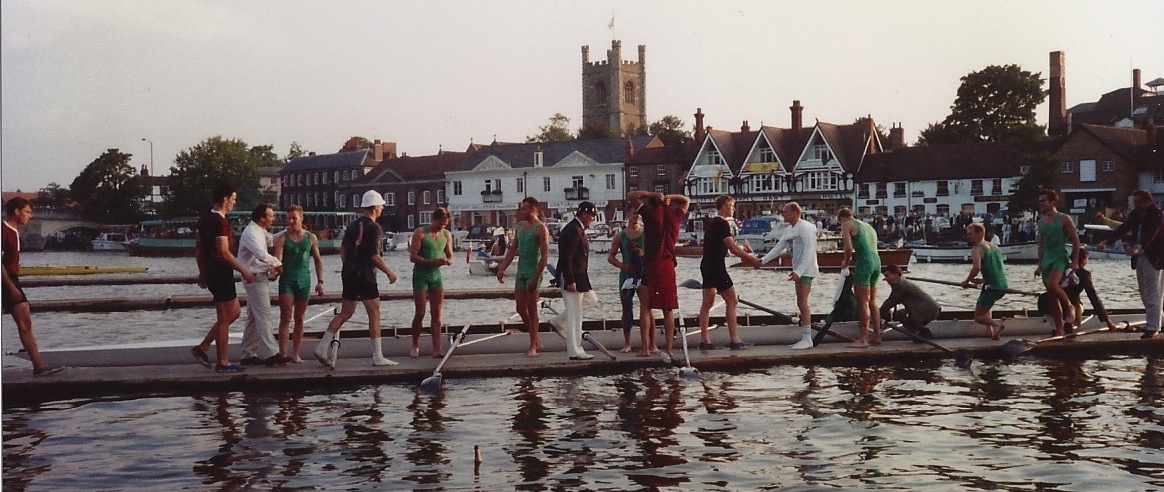The public reaction to David Walliams’ marathon eight-day swim along 140 miles of the River Thames in aid of Sport Relief is reminiscent of the acclaim received by an earlier endurance swimmer. When, at 10:41 am on 25 August 1875, Captain Matthew Webb struggled ashore near Calais to become the first man to swim the English Channel unaided, he too became a national hero. Occurring at the time when sports such as football, rugby and tennis were becoming more organized and codified, his achievement did much to popularize swimming as a sport. It also heralded a golden era of pool building between the 1880s and the outbreak of the First World War when more than 600 baths were constructed.
Webb was born on 18 January 1848 at Dawley, Shropshire, one of twelve children of Doctor Matthew Webb and his wife Sarah. Dawley is just a few miles from Much Wenlock where, in 1850, another doctor founded the Wenlock Olympian Class which later inspired de Coubertain to establish the modern Olympic Movement.
His birth certificate records that the son of the surgeon was born at Dawley Green. British History Online notes,”By the mid 19th century High Street, as Dawley Green came to be known, had gained most of the features of a small town…”.
When Matthew Webb was just a few years old, the family moved the short distance to nearby Madeley. The 1851 census, lists the Webb family as living in High Street, Madeley. By his eighth birthday, the younger Matthew had learned to swim in the River Severn below Ironbridge.
Aged 12, he joined the training ship Conway on the Mersey before embarking on a career in the merchant navy where he gained a reputation as a strong, but not necessarily fast, swimmer. In 1874, he was awarded the Stanhope gold medal after diving into heavy seas in the Atlantic in an unsuccessful attempt to rescue a passenger who had fallen overboard.
Webb was serving as captain of the Liverpool ship, Emerald, when, in early 1875, he read a newspaper report of an unsuccessful attempt to swim the English Channel. Inspired, he left the merchant navy to prepare for his own attempt.
A first attempt on 12 August 1875 was thwarted when heavy seas threatened to overwhelm his support boat. He started his second attempt on 24 August, diving off the Admiralty pier in Dover at 1 p.m.
Battling against strong currents, it is estimated that Webb actually swam close to 40 miles in the 21 hour 45 minutes he spent in the water. (Benefiting from the 130 years of accumulated open water swimming experience, David Walliams’ completed his own cross channel swim in aid of the 2006 Sport Relief in around a quarter of the time: 10 hours 34 minutes.)
As a national hero, Webb was feted everywhere as he toured the country lecturing. However, his celebrity did not bring prosperity. Having married Madeleine Chaddock in Fulham on 27 April 1880, he was compelled to take part in a variety of endurance swimming races and demonstrations in Britain and America in order to earn a living.
He ended a race against Dr Jennings on 1 October 1881 at Hollingworth Lake near Rochdale in a state of utter exhaustion. This was considered to be a turning point in his career.
In search of what he hoped would be a big pay-day, Webb sailed with his wife, son and baby daughter to America in 1883. His plan was to swim downriver through the narrow gorge that runs away from the foot of Niagara Falls and on through Niagara’s treacherous Whirlpool. Disregarding warnings from friends, Webb left his family at Nantucket, where he had spent a few days training, and traveled alone to the Falls. At 4 pm on 24 July he dived into the middle of the river from a rowing boat. He was instantly swept away by the strong currents. His body was recovered by fishermen some days later and was laid to rest in the nearby Oakwood Cemetery.
Some 34 years after he conquered the Channel and helped re-ignite interest in swimming as a sport, his elder brother Thomas unveiled a memorial to Webb in his Dawley birthplace.
This was the year after FINA, swimming’s world governing body, was established at a meeting on 19 July at the Manchester Hotel, London, at the culmination of the 1908 London Olympics.




